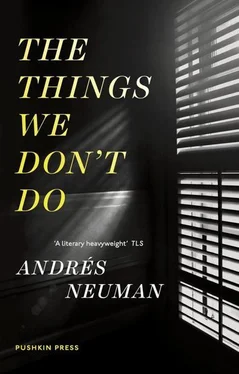I ENTERED THE HOSPITAL filled with hatred and wanting to give thanks. How fragile is anger. We could shout, hit or spit at a stranger. The same person whom, depending on their verdict, depending on whether they tell us what we are desperate to hear, we would suddenly admire, embrace, swear loyalty to. And that love would be a sincere one.
I went in not thinking anything, thinking about not thinking. I knew my mother’s present, my future, depended on the toss of a coin. And that that coin wasn’t in my hands, perhaps it was in nobody’s, not even those of the doctor. I have always thought that the absence of god relieves us of an intolerable burden. Yet more than once, when going in or out of a hospital, I have longed for divine mercy. Multitudinous, full of seats, corridors, hierarchies and rituals of hope, silent on their upper floors, hospitals are the closest thing to a cathedral we unbelievers can step into.
I went in trying to avoid this line of reasoning, because I feared I would end up praying like a hypocrite. I offered my arm to my mother, who had so often given me hers when the world was very big and my legs very short. Is it possible to shrink overnight? Can someone’s body turn into a sponge which, impregnated with fears, gains in density while losing volume? My mother seemed smaller, thinner, and yet more weighed down than before, as though prone on the floor. Her porous hand closed around mine. I imagined a little boy in a bathtub, naked, expectant, clutching a sponge. And I wanted to say something to my mother, and I didn’t know how to speak.
The proximity of death squeezes us in such a way that we might be capable of losing our convictions, of letting them ooze out like a liquid. Is that necessarily a weakness? Perhaps it is a final strength: to arrive somewhere we never expected to arrive. Death multiplies our attention. It wakes us twice. The first night I spent with my mother when they admitted her to hospital, or when she admitted herself to an area within herself, I confirmed a suspicion: some kinds of love cannot be requited. However much a child recompenses his parents, there will always remain a debt, shivering with cold. I have heard it said, I have said it myself, that no one asks to be born. But being born through another’s will is more of a commitment: someone has given us a gift. A gift which, as is customary, we didn’t ask for. The only coherent way of refusing it would be to kill oneself on the spot, without a word of complaint. And no one accompanying their stumbling mother, their shrunken mother to the hospital, would think of taking their own life. The life she gave them.
What was my mother’s illness? It doesn’t matter. It is the least important thing. It is out of focus. An illness that made her walk like a little girl, draw closer step by step to the ungainly creature she had been at the beginning of time. She confused the name and functions of her fingers as in an indecipherable game. She mixed up her words. She couldn’t walk straight. She bent over like a tree that mistrusts its branches.
We entered the hospital, we never finished going into it, the threshold was another country, a border within a border, and we were coming into the hospital, and someone tossed a coin, and the coin dropped. It is so basic that your reason loses the thread. An illness has its stages, its precedents, its causes. The drop of a coin, however, has no history or nuances. It is an event that burns itself out, that determines itself. Memory can suspend the coin, slow its ascent, recreate the tiny waverings during its trajectory. But those ruses are only possible after it has dropped. The original movement, the coin’s flight, belongs in an absolute present. And no one, I know that now, is capable of speculating while they watch a coin drop.
The sponge, she said, the sponge a bit higher, my mother said, sitting in the bathtub in her room. Higher, yes, the sponge, she urged me, and I was struck by the effort she had had to make to utter that simple phrase. And I rubbed her back with the sponge, drew circles on her shoulders, ran over her shoulder blades, slid down her spine, and before I finished I traced on her wet skin the words I hadn’t been able to say to her until now, when we crossed the border together.
THIS IS YOUR CHAIR, you see? please, sit down.
I have unfolded the backrest, checked the wheels and wiped them with a damp cloth so that your hands remain white. White, not innocent: we aren’t much interested in innocence, you and I. Whiteness, yes, because it requires effort, it has to be safeguarded.
I’ve been preparing it, you know? for months, years, I don’t really remember. The same thing always happens to me with this chair, I become so focused on it that the days roll by and I forget how long I have been waiting for you. Come, I’m going to tidy your hair, I’ll comb it as patiently as on any great occasion, as though your hairs were the strings of one of those instruments you love so much. Because today, this morning or this afternoon, what is the time? today, for the first time, we are going to use this wheelchair which doesn’t upset you, the way the mild light can’t upset you, or the smell of coffee from the terraces or the breeze that will ruffle your hair. And that’s as it should be, don’t you think? We don’t tidy things so they will remain intact, we tidy them in order to invite time to do its work.
So, we are ready, well, almost. We are ready, except for the small matter of the bonnet. That green bonnet, shall we keep it on you or not? Granted it gives you a jaunty air, perhaps it makes you look younger. Although I know it restricts your view and makes a little balcony of shade. Best we take it off. You can always carry it in your lap, in case the sun decides to be fickle.
The sun is fickle, you reply, that’s its nature. I hold back the push I was about to give your chair. You’re right, Mama, quite right: that is its nature. The sun’s unpredictability is what gives it its miraculous quality. We can agree on that. What I am not clear about is whether that means you are going to wear the green bonnet or not.
Have we forgotten anything? Let’s go through it. Whenever we go out together I become easily distracted, you can take that as a compliment, how coquettish you look. Have we got everything? Your charm bracelet? Your light jacket? Your yellow shawl? I think we’ll be warm enough, the sun here is fickle but strong as well. I promise you radiant streets. I promise you more birds than cars. I promise you we’ll laugh. And then if we need to cry, we’ll cry.
What a lovely breeze, can you feel it? Imagine how it will caress us once we get going. I like saying it like that, in plural, we get going, because I think that’s what is good about using this chair, we engage with each other’s body, one push makes two walk. I like your feet more than ever today, I can see the longing in your heels, each toe as impatient as the next, are those sandals new?
Now, please release the brakes. That’s it, slowly. One, now the other. Perfect. Considering it’s your first time, you seem like an old hand. I’m moving, we’re moving. This is much better than I’d expected. Do you like it? Are you having fun? Let’s pretend we’re on a boat. You be the lookout and I’ll be the helmsman. Off I go, off we go. I can hear you singing now. I can see the sails swelling. We’re rolling so fast, we must do this again. Look at the wheels, let them spin, let them never come to a halt. Are you all right? Are you comfortable? This outing really was a great idea. Rapid chair, chair of time, empty chair through space. Chair filled with somebody who might have sat down.
Читать дальше












